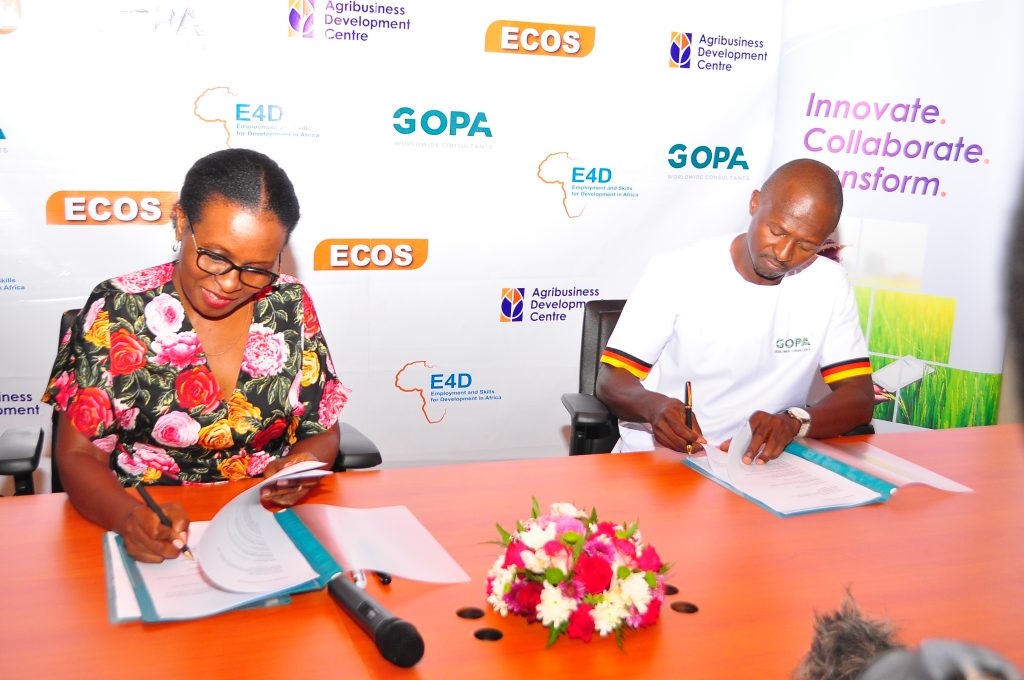A collaborative partnership between GIZ’s Employment and Skills for Development in Africa program (E4D) and the Agribusiness Development Centre (ADC) aimed at supporting 200 agribusinesses in Uganda has been formed. This cooperation is within the framework of the Enhancing the Competitiveness of Small and Medium Size Enterprises (ECOS) project, where ADC shall add value to the ECOS project to ensure increased access to finance, investments, and financial readiness, market development and linkages, innovation, and digitalization, plus upgrading quality management systems for the selected enterprises.
The ECOS project was launched in April 2022 with the major objective of increasing the competitiveness of 1,000 Ugandan SMEs, creating 3,000 jobs and improving the employment situations of 22,000 people. This project is implemented by the Deutsche Gesellschaft fur Internationale Zusammenarbeit (GIZ) under the Employment and Skills for Development in Africa (E4D) program through a consortium of firms (GOPA Worldwide consultants, Agriculture and Finance Consultants (AFC) and E360 Group Limited) and is funded by the German Federal Ministry for Economic Cooperation and Development (BMZ) and the Norwegian Agency for Development Cooperation (NORAD).
The project’s priority sectors are agriculture and food processing, manufacturing, tourism, hospitality, green sectors, and construction.
According to Donald Agaba, Head of Programme, E4D, the cooperation between E4D and ADC seeks to address various challenges affecting agribusinesses, which include lack of proper governance structures, high financial and digital illiteracy, poor record keeping, limited exposure to risk management expertise, poor quality of products, and tools, lack of business management and technical skills, inadequate business plans and feasibility study for their ventures, and limited access to financing and markets, among others.
The partnership aims at making a case for continued capacity development of the selected enterprises for bankability, growth, and job creation through two (2) tracks;
- Conducting a Business Acceleration Program targeting 100 small and medium agribusinesses (40% of which shall be women-led) by providing training, business mentoring and coaching to trigger linkages for at least 50% of them, thus creating 50 jobs by end of 2023.
- Offering Price Risk Management training, support financial management and cash flow projections to 100 Small and Medium Agribusiness (especially in Cocoa and Coffee value chains) to enable them access finance that triggers growth and 100 decent jobs by end of 2023. A total of two (2) price risk management courses and exposure to the use of simple financial packages and digital tools to improve efficiency shall be conducted. The outcome of which is automated leaner processes and reduced errors and costs in operations.
- Coordinating the placement of at least 100 interns by the end of 2023.
ADC shall in addition incentivize participation and commitment to change by equipping at least 40 enterprises with simple financial packages that can innovatively improve their record-keeping and financial reporting through utilizing innovative e-learning platforms. The project shall be delivered through a multifaceted approach focused on training, mentoring, coaching, and technical assistance to address the main constraints to accessing and using financial services for improved business operations, investment readiness, and linkages to funding for growth and job creation. ADC will also integrate key themes of gender and green growth for sustainability within the capacity building modules, the outcome of which being enterprises developing strategies on the same as well as establishing key indicators to track women’s participation in SME leadership.
